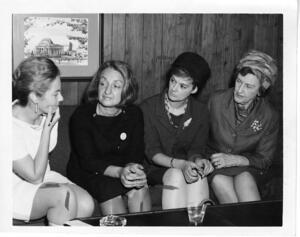Using Our Voices Wisely
This month our Rising Voices Fellows are examining how their Jewish and feminist identities intersect. Be sure to check the JWA blog each Tuesday for a new post from our fellows—and check out the great educational resources provided by our partner organization, Prozdor.
“Above all, the prophets reminded us of the moral state of a people: Few are guilty, but all are responsible.” – Abraham Joshua Heschel
The feminist movement is a de facto community. Feminists tend to work in groups, be they virtual or physical, as we unify around our shared convictions. As people committed to ostensibly similar goals, we concern ourselves with the statements made by others who claim the same title. Any time a major article is published by a prominent feminist writer on a feminist site or in a mainstream publication, it immediately draws criticism. Much of this criticism is from those who don’t identify as feminists; these critiques tend to be mixed, some offering interesting new ideas while others simply express sexism. Feminists, however, also engage in a substantial amount of internal self-criticism.
Feminists hold each other responsible for our communal moral state. As a movement driven partly by the idea of sisterhood, we all function both as Heschel’s prophets and as members of the people. Any time a feminist makes a statement that is racist, heteronormative, or transphobic, for example, other feminists step up to hold her responsible. Even if it is a single speaker, as feminists we recognize the need for our community to be one that is supportive of the needs of all women, and an integral part of the debate over how best to do that is the “calling out” of other feminists. We are all responsible for the moral state of our movement, for making sure that we are doing our best to stand up for all women. Taking that responsibility seriously means that we all must act as prophets.
Many Jewish American feminists have a unique position in that we can be and have been both oppressed and oppressor. We, collectively, have experience of prejudice, but now have a fair bit of cultural power. Therefore, we must draw on our experiences and cultural narratives of discrimination and oppression to ensure that we work to avoid being “white feminists.” White feminism is defined by Cate at BattyMamzelle as “a specific set of single-issue, non-intersectional, superficial feminist practices. It is the feminism we understand as mainstream; the feminism obsessed with body hair, and high heels and makeup, and changing your married name. It is the feminism you probably first learned.” Jewish women have been tremendously active “white feminists.” Many Second-Wave feminist heroines, including Gloria Steinem, Bella Abzug, and Betty Friedan fall into this category; their feminism was transformative, but only for a very narrow group of women.
As a white, cisgendered, heterosexual, middle-class Jewish girl, I’ve found the work of these women personally inspiring and impactful. The more I read, however, the more I’ve had to confront the narrow scope of this feminism; “white feminism” has been the feminism that I’m most familiar and comfortable with, but it’s far from the most encompassing, important, and just movement out there. A feminism that is intersectional, which includes issues of racism, classism, ableism, and other systemic injustices, simply matters more to the world. How high I could move up a career ladder while having children is an issue that matters, but it’s also part of a much larger system of economic injustice, one that the corporate system I would have that struggle in perpetuates.
As a highly privileged person, I’ve started to make a concrete effort to both check my privilege on a regular basis and to use this privilege to amplify the voices of others, rather than my own. I now take very seriously my responsibility to call my friends out when they use racist, homophobic, or transphobic language, in addition to pointing out sexism. I use my social media presence to share articles written by people who face very different struggles than I and most of my friends do. Awareness of these fights should be just the first step; as I move into the world, I now know how crucially important and morally imperative it is to be conscious of the way my life is shaped by privilege, and to work to dismantle that privilege.
As Jewish American women, we find ourselves in a unique position. We are members of a group who shares the cultural background of thousands of years spent as an oppressed class. Our religious texts and holidays discuss ideas of being a minority, of oppression, and of liberation. Today, we rarely experience oppression based on our Judaism. We are in the unique position of having a cultural narrative of oppression while no longer being oppressed as a class (though many Jewish people worldwide still do face discrimination and oppression on a regular basis). In this position, Jewish American feminists have a unique responsibility to ensure that we are acting as “prophets” in the wider feminist community; we are sensitized to oppression but are now largely privileged. We have access to structures of power and loud voices to employ; it’s crucial that we use these voices to amplify the voices of others.







Word. Excellent piece. Strongly agree. It's so important that we look beyond what you call "white feminism" and strive to be more inclusive.